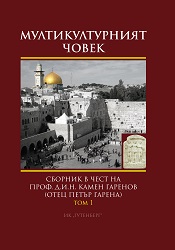Българите в Украйна до разпадането на Руската империя
Bulgarians in Ukraine until the disintegration of the Russian Empire
Author(s): Vladimir Kaloyanov
Subject(s): History, Cultural history, Comparative history, Diplomatic history, Ethnohistory, Local History / Microhistory, Recent History (1900 till today), Special Historiographies:, Interwar Period (1920 - 1939), WW II and following years (1940 - 1949), History of Communism
Published by: Издателска къща "Гутенберг"
Keywords: settlers; Bulgarian history; Ukraine; Ukraina; Bulgaria; emigrant; emigrants; politic events; World War I; communism; Russian Empire; Soviet; Krastyo Rakovski;
Summary/Abstract: The numerous and once monolithic Bulgarian national enclave, which had lived for many years in the Northern Pryazovia steppes, suffered numerous calamities. The first settlers arrived in the Pryazovia in the summer and fall of 1861 and the settlement was finally completed only in 1863. The social and economic development of the Bulgarian colonies was under the influence of the system of assimilation policy of the Russian Empire in respect to national minourities. In spite of the conditions, some Bulgarian port settlements quickly turned into commercial and industrial centres. The Bulgarian settlers upheld their Bulgarian national identity against the pressure of the assimilation policy mainly by preserving their native language, everyday life, customs, rites, feasts and folklore. In the first years of settlement the Bulgarians, particularly those in the Crimean Peninsula (Tauris) focused on and managed to achieve the opening of schools, at first only in several large settlements and later in all Bulgarian villages. In Preslav there was even a Central Bulgarian School subordinate to the Ministry of State Properties. Russia's assimilatory imperial policy also influenced the cultural development of the Bulgarian settlers. Official lay and church authorities were hostile to the language and some elements of the traditional life of Bulgarians under the pretext that they were heathen. Bees and other youth gatherings of definitely Bulgarian outlook were presecuted. Theatical and other amateur performances n Bulgarian were banned. At the same time, as loyal subjects, Bulgarians were active participants in World War I, in both recruitment and requisition. The Civil War did not pass by the Bulgarian settlements either. In some parts they formed armed bands and became part of the Free Territory organized along anarchist lines.
At the establishment of Soviet power, the Ukrainian government was headed on three occasions by the Bulgarian Krustyu Rakovski. When Tauris became Soviet, the mayors, clerks and popular guards who enjoyed confidence in the Bulgarian settlements were s wept away. About then or more thousnad Bulgarians perished in the turbulent period of 1917-1922. The intelligentsia, which usually came from broad-minded affluent families, war a particular victim. The road to inveigle the authorities to grant some cultural (and partly administrative) "autonomisation" of the Tauris Bulgarians was opened with the establishment of a Bulgarian Bureau with the Central Commitee of the Communist Party (Bolshevik) of Ukraine and the publication of the 'Surp i Chuk' (Hammer and Sickle) newspaper in Bulgarian. The resistant against collectivization and the subsequent artificially induced famine in 1932-1933 cost the live of 20 000 Tauris Bulgarians. This also continued during the unprecedented Great Purge until Stalin's death in 1953 to which many Ukrainian Bulgarians fell victim.
- Page Range: 349-396
- Page Count: 48
- Publication Year: 2016
- Language: English, Bulgarian
- Content File-PDF

